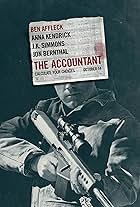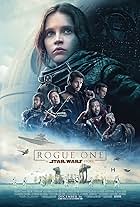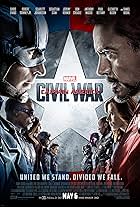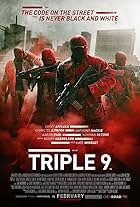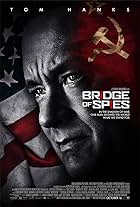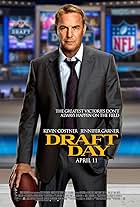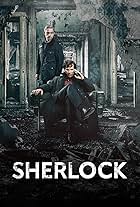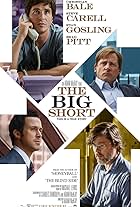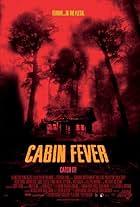
Simon_Says_Movies
Joined Sep 2005
Welcome to the new profile
We're still working on updating some profile features. To see the badges, ratings breakdowns, and polls for this profile, please go to the previous version.
Ratings2.2K
Simon_Says_Movies's rating
Reviews138
Simon_Says_Movies's rating
So abundant and seamlessly integrated into the narrative of Spike Jonze's Her is the exploration of love, and everything associated with that indescribable, crippling feeling, that immediately as the credits role it's clear a repeat viewing is essential. So rare is it that a filmmaker has asked so many of the right questions about the nature of relationships and answered just enough of them in just the right ways. And so soul inflating is it to have a film, so outlandish and odd in basic premise, to organically connect with elements of life that we've all worked through in one way or another. The very fact that Jonze still finds the time to effortlessly combine science fiction elements and biting, often hilarious social satire is a testament to the brilliance of this tale and immediately stands not only a love story for our time but one that will only become more resonant as time passes.
Her examines love at levels that are simultaneously, and fundamentally, beyond us as human beings and as intimate and natural as we've ourselves experienced. The film doesn't attempt to sell it as merely an illusion – a made-up fairytale for the deluded – nor does it spin it into something artificially fluffy and over romanticized. What is at play is as far from the emotions explored in most rom-coms as can be.
The way Jonze is able to explore these aspects comes from a multitude of directions, from having our central character of Theodore (Joaquin Phoenix) struggling through the all too familiar grind of heartbreak, to his very vocation and on to his friendship with a woman down the hall (Amy Adams). But the way Her really goes beyond the average constraints of a film tackling this subject is with its futuristic setting which blends the technological revolution and everything (good and bad) that journeys along with "progress."
In the process of finalizing a divorce, Theodore purchases a new, highly advanced operating system which has the capacity to learn and evolve as it experiences the wonders of the world. Samantha, as she names herself and voiced by Scarlett Johansson, is what springs forth from the software and he immediately becomes smitten not only because of her gentle, inquisitive nature but because they legitimately seem understand one another. From this launching point, and as we see their bond deepen, we are forced to ask ourselves if this love is real or some sort of sick delusion being perpetuated by a heartbroken individual and a piece of gadgetry just doing what it was programmed to do.
Yet the questions flood far beyond that as we then contemplate how to truly determine what "real" love is and if it has to be between two breathing humans to be true. I could quite literally expand on this very query for another 1000 words but instead I implore you to simply view the film and see for yourself what mindset emerges. On the flip side, Samantha, in all her advancement, struggles with having no physical body finds a divide that cannot be filled growing between them. Also intelligently explored is precisely how an AI such as this may ultimately evolve given the circumstances. As much as this all works as it plays out on screen, so much of this has uncomfortably authentic parallels to real relationships it achieves a whole new level of truthfulness.
Then of course there is the whole exploration of society's descent into self imposed isolation, seeking out either artificial or easy emotional connections over the real thing. Her fascinatingly poses the question that this is both a deeply unsettling phenomenon but also a weirdly natural progression. In this futuristic world, flush with odd, vibrant fashion sense (and what appears to be the return of the moustache) the prevalence of technology, be it a sassy holographic video game or what is 24/7 connectivity is not overtly painted as mankind's demise, and while that could turn out to be the case, Jonze doesn't wish to look at it as merely black or white.
The performances of what are essentially three main leads are all tremendous, with Phoenix anchoring the film as our flesh and blood protagonist. Married with Jonze's script, we meet with a gentle, sensitive, often introverted man, who within minutes feels like a real flesh and blood person and one we can sympathize with on this odyssey. There is both a naïveté and aura of frustration to this character and despite acting opposite nobody for a great deal of the film, he sells every second.
Much of why this on screen relationship works so well is due to Johansson's transcendent voice, as with every word she makes us feel as if Samantha is standing before her eyes. Between this and her brilliant turn in Don Jon, this leading lady has unequivocally shown she is more than just a pretty face. Finally, in a memorable and crucial supporting role Adams as Theodore's long-time friend is the foil to his digital connection and is a character through which some of the film's most important revelations, and further questions, flow.
I fear that some may find Her to be too odd, and by looking to the fluorescent colours, focussing on the weirdness or simply psyching themselves out because of the very premise, they will miss what the film is really saying. I know that despite holding my attention throughout I still missed some of what this film was trying to get across. Despite the boldness and high concept at play, Jonze has no pretensions about what he is exploring and as such has crafted one of the most complex and unforgettable love stories ever put to film.
Her examines love at levels that are simultaneously, and fundamentally, beyond us as human beings and as intimate and natural as we've ourselves experienced. The film doesn't attempt to sell it as merely an illusion – a made-up fairytale for the deluded – nor does it spin it into something artificially fluffy and over romanticized. What is at play is as far from the emotions explored in most rom-coms as can be.
The way Jonze is able to explore these aspects comes from a multitude of directions, from having our central character of Theodore (Joaquin Phoenix) struggling through the all too familiar grind of heartbreak, to his very vocation and on to his friendship with a woman down the hall (Amy Adams). But the way Her really goes beyond the average constraints of a film tackling this subject is with its futuristic setting which blends the technological revolution and everything (good and bad) that journeys along with "progress."
In the process of finalizing a divorce, Theodore purchases a new, highly advanced operating system which has the capacity to learn and evolve as it experiences the wonders of the world. Samantha, as she names herself and voiced by Scarlett Johansson, is what springs forth from the software and he immediately becomes smitten not only because of her gentle, inquisitive nature but because they legitimately seem understand one another. From this launching point, and as we see their bond deepen, we are forced to ask ourselves if this love is real or some sort of sick delusion being perpetuated by a heartbroken individual and a piece of gadgetry just doing what it was programmed to do.
Yet the questions flood far beyond that as we then contemplate how to truly determine what "real" love is and if it has to be between two breathing humans to be true. I could quite literally expand on this very query for another 1000 words but instead I implore you to simply view the film and see for yourself what mindset emerges. On the flip side, Samantha, in all her advancement, struggles with having no physical body finds a divide that cannot be filled growing between them. Also intelligently explored is precisely how an AI such as this may ultimately evolve given the circumstances. As much as this all works as it plays out on screen, so much of this has uncomfortably authentic parallels to real relationships it achieves a whole new level of truthfulness.
Then of course there is the whole exploration of society's descent into self imposed isolation, seeking out either artificial or easy emotional connections over the real thing. Her fascinatingly poses the question that this is both a deeply unsettling phenomenon but also a weirdly natural progression. In this futuristic world, flush with odd, vibrant fashion sense (and what appears to be the return of the moustache) the prevalence of technology, be it a sassy holographic video game or what is 24/7 connectivity is not overtly painted as mankind's demise, and while that could turn out to be the case, Jonze doesn't wish to look at it as merely black or white.
The performances of what are essentially three main leads are all tremendous, with Phoenix anchoring the film as our flesh and blood protagonist. Married with Jonze's script, we meet with a gentle, sensitive, often introverted man, who within minutes feels like a real flesh and blood person and one we can sympathize with on this odyssey. There is both a naïveté and aura of frustration to this character and despite acting opposite nobody for a great deal of the film, he sells every second.
Much of why this on screen relationship works so well is due to Johansson's transcendent voice, as with every word she makes us feel as if Samantha is standing before her eyes. Between this and her brilliant turn in Don Jon, this leading lady has unequivocally shown she is more than just a pretty face. Finally, in a memorable and crucial supporting role Adams as Theodore's long-time friend is the foil to his digital connection and is a character through which some of the film's most important revelations, and further questions, flow.
I fear that some may find Her to be too odd, and by looking to the fluorescent colours, focussing on the weirdness or simply psyching themselves out because of the very premise, they will miss what the film is really saying. I know that despite holding my attention throughout I still missed some of what this film was trying to get across. Despite the boldness and high concept at play, Jonze has no pretensions about what he is exploring and as such has crafted one of the most complex and unforgettable love stories ever put to film.
Whether talking about a cinematic experience or hearing details of the real thing, the gallantry and heroism of our men and women at arms can never be overstated, be it in service to the defenseless, protecting the nation or for reasons with which everyone may not agree. Though ironically just that – overstated – at a number of junctures, Peter Berg's Lone Survivor is nevertheless an often breathless and riveting tale of a small band of brother's desire to survive, and how a greater objective can become a moot point at a moments notice.
Lone Survivor once again makes the case that focusing on a smaller portion of a greater conflict is the proper way to go when attempting to make the events of a war film hit close to home. While sweeping, melodramatic conflict driven dramas have their place (and there are some great ones) there is little substitute to spending an intense two hours with a few select individuals as you follow them through a life or death ordeal. When the film's very title overtly hints that there will certainly be more death than life on screen, the experience becomes that much more uncomfortable and traumatic as we watch in unfold, unable to do anything but act as helpless spectator.
The biggest compliment that I can pay to Lone Survivor is that it uses the already established nature of its outcome to its advantage rather than allow it to become a constraint that would dampen the impact. Despite the fact that only Mark Wahlberg's Marcus Luttrell escapes from the mountainous Kunar province of Afghanistan after the botched Red Wings assassination mission, equal time is spent with his three fellow Navy SEALs, never using them merely as canon fodder as our indestructible hero defeats the odds. The film treats them as humans, with loved ones, fears and souls and in doing so, as they are overcome by their ordeal, the losses hit closer to the heart.
The simple fact we are aware of the outcome means the very journey organically notches up the suspense and all encompassing sense of dread. The stench of death is oppressive and in caring for these individuals and knowing and witnessing their fate it evokes a sort of anger reminiscent of the unfairness present in real conflict. Good, honest men may die, and it may be the furthest thing from fair or just, but that's simply the ugly nature of the beast, and Lone Survivor mirrors that frustration through its execution alone.
The four principle cast members are all extremely solid, utilizing their shared screen time to great effect be it alone or with the group. Wahlberg, perpetually the everyman, anchors the picture and brings both the physicality and necessary weakness as the film evolves from firefight to survival situation. Ben Foster and Emile Hirsch have just the right look and overall level of public exposure to recede into their doomed characters, as they too sell their respective journeys towards the end. By far the most surprising member in terms of performance was that of Taylor Kitsch (reteaming with Berg after the dreadful Battleship) who in addition to acting believably as the squad leader employs a delicate blend of grace, heroism and humanity to a role that could have been anything but. This performance proves this young man has a future far beyond doomed blockbusters.
The film's biggest folly comes when it paints these soldiers as nearly indestructible machines of war. Amidst what is some of the best shot and choreographed fighting in recent memory we get so many noble, eyes to the sky, slump to the knees, death scenes it both seeks to undermine the credibility of the situation and the otherwise brutal and realistic injuries these men endure. It's at those points that Lone Survivor makes itself clear it's no Saving Private Ryan. In films of that echelon when someone is on the receiving end of a bullet, in that moment at least, it is anything but heroic and patriotic. It's a person, alone in a pool of blood, gasping on a last few futile breaths, and its all the more searing because of it.
All that being said, Lone Survivor puts us and its protagonists through the ringer and while presenting them as the supposed elite, never releases its grasp on the situation at hand in favour of pro American pandering. It's as intense and grisly as an experience you're likely to witness this year and though it stops short of greatness, its strides are mighty enough to take us places we don't want to be, and that we can't leave behind.
Lone Survivor once again makes the case that focusing on a smaller portion of a greater conflict is the proper way to go when attempting to make the events of a war film hit close to home. While sweeping, melodramatic conflict driven dramas have their place (and there are some great ones) there is little substitute to spending an intense two hours with a few select individuals as you follow them through a life or death ordeal. When the film's very title overtly hints that there will certainly be more death than life on screen, the experience becomes that much more uncomfortable and traumatic as we watch in unfold, unable to do anything but act as helpless spectator.
The biggest compliment that I can pay to Lone Survivor is that it uses the already established nature of its outcome to its advantage rather than allow it to become a constraint that would dampen the impact. Despite the fact that only Mark Wahlberg's Marcus Luttrell escapes from the mountainous Kunar province of Afghanistan after the botched Red Wings assassination mission, equal time is spent with his three fellow Navy SEALs, never using them merely as canon fodder as our indestructible hero defeats the odds. The film treats them as humans, with loved ones, fears and souls and in doing so, as they are overcome by their ordeal, the losses hit closer to the heart.
The simple fact we are aware of the outcome means the very journey organically notches up the suspense and all encompassing sense of dread. The stench of death is oppressive and in caring for these individuals and knowing and witnessing their fate it evokes a sort of anger reminiscent of the unfairness present in real conflict. Good, honest men may die, and it may be the furthest thing from fair or just, but that's simply the ugly nature of the beast, and Lone Survivor mirrors that frustration through its execution alone.
The four principle cast members are all extremely solid, utilizing their shared screen time to great effect be it alone or with the group. Wahlberg, perpetually the everyman, anchors the picture and brings both the physicality and necessary weakness as the film evolves from firefight to survival situation. Ben Foster and Emile Hirsch have just the right look and overall level of public exposure to recede into their doomed characters, as they too sell their respective journeys towards the end. By far the most surprising member in terms of performance was that of Taylor Kitsch (reteaming with Berg after the dreadful Battleship) who in addition to acting believably as the squad leader employs a delicate blend of grace, heroism and humanity to a role that could have been anything but. This performance proves this young man has a future far beyond doomed blockbusters.
The film's biggest folly comes when it paints these soldiers as nearly indestructible machines of war. Amidst what is some of the best shot and choreographed fighting in recent memory we get so many noble, eyes to the sky, slump to the knees, death scenes it both seeks to undermine the credibility of the situation and the otherwise brutal and realistic injuries these men endure. It's at those points that Lone Survivor makes itself clear it's no Saving Private Ryan. In films of that echelon when someone is on the receiving end of a bullet, in that moment at least, it is anything but heroic and patriotic. It's a person, alone in a pool of blood, gasping on a last few futile breaths, and its all the more searing because of it.
All that being said, Lone Survivor puts us and its protagonists through the ringer and while presenting them as the supposed elite, never releases its grasp on the situation at hand in favour of pro American pandering. It's as intense and grisly as an experience you're likely to witness this year and though it stops short of greatness, its strides are mighty enough to take us places we don't want to be, and that we can't leave behind.
It's not often that one can trace back the origins of an entire genre to one body of work, let alone have that seminal entity still directly influence all its successors in one way or another. We can from time to time point out overt homages to a keystone effort or see themes and imagery blatantly stolen, but in the case of George A. Romero's Night of the Living Dead, we've simply seen a genre organically (and sometimes brilliantly) evolve within the confines of the trendsetter's mould.
Efficiently and entertainingly, Birth of the Living Dead takes us back to the late 1960's where times were tough, social divides were widening and where one nearly novice auteur dared to craft a horror film unlike anything audiences had seen before, and arguably, haven't seen since.
In viewing the first entry in Romero's "Dead" series decades after its first release, not analyzing what it must have meant at the time is an easy feat. For most watching it now, they'll be struck by how well it holds up, rather than that it featured stark parallels to the climate at that time, both intentionally and otherwise. Race wars at home raged, and so too did the Vietnam War overseas – the symbolism of unstoppable, remorseless monsters laying siege to one's home rung far too true in some cases. Birth of the Living Dead strips away these layers and provides us with a capsule of time when a movie became more than just a movie.
The film also intriguingly touches on the casting of African American lead Duane Jones, an addition to the crew that was purely based on skill, and who was not accompanied by changes to the script to address his ethnicity. This resulted in (at the time) a black man serving as the leader of a group of white folk who did not engage in slurs or anything of the like and instead played things out as it would between those of the same race, or if those prejudices did not exist at all. It was man versus the undead and man versus man at the same time, but not because of racism.
All of this insight would of course be for nought if Mr. Romero himself were not to wryly chime in on his experiences, thoughts on the actors, the filmmaking process and everything around and in between. At age 73 he's still as chipper and sarcastic as ever, and frankly is just a blast to watch on screen. Furthermore, his commentary of things he would have changed today and things he wished could have been accomplished then, help to flesh out a man who has spent his life in the industry.
If there was one major complaint I would have against Birth of the Living Dead it would be its slim runtime. While digestible in the best of ways, it could have dug a little deeper into the mythos of the film and the actual filmmaking process. It's a shame that many of the cast and crew have passed on since filming as their lack of insight into how the process went for them softens the bite of the documentary a tad, but of course I can't lay blame on something that cannot be altered, and as it stands it still paints a very vivid picture.
While slight in areas, I would certainly label Birth of the Living Dead as essential viewing for fans of zombie films, Night of the Living Dead or of the man behind the magic. It's overall an immensely enjoyable watch that should leave most fans, save the die-hard, with something new to mull over about one of the greatest horror films of all time. If at the very least it makes you want to partake in another viewing of the iconic flick, then that's good enough in my book.
Efficiently and entertainingly, Birth of the Living Dead takes us back to the late 1960's where times were tough, social divides were widening and where one nearly novice auteur dared to craft a horror film unlike anything audiences had seen before, and arguably, haven't seen since.
In viewing the first entry in Romero's "Dead" series decades after its first release, not analyzing what it must have meant at the time is an easy feat. For most watching it now, they'll be struck by how well it holds up, rather than that it featured stark parallels to the climate at that time, both intentionally and otherwise. Race wars at home raged, and so too did the Vietnam War overseas – the symbolism of unstoppable, remorseless monsters laying siege to one's home rung far too true in some cases. Birth of the Living Dead strips away these layers and provides us with a capsule of time when a movie became more than just a movie.
The film also intriguingly touches on the casting of African American lead Duane Jones, an addition to the crew that was purely based on skill, and who was not accompanied by changes to the script to address his ethnicity. This resulted in (at the time) a black man serving as the leader of a group of white folk who did not engage in slurs or anything of the like and instead played things out as it would between those of the same race, or if those prejudices did not exist at all. It was man versus the undead and man versus man at the same time, but not because of racism.
All of this insight would of course be for nought if Mr. Romero himself were not to wryly chime in on his experiences, thoughts on the actors, the filmmaking process and everything around and in between. At age 73 he's still as chipper and sarcastic as ever, and frankly is just a blast to watch on screen. Furthermore, his commentary of things he would have changed today and things he wished could have been accomplished then, help to flesh out a man who has spent his life in the industry.
If there was one major complaint I would have against Birth of the Living Dead it would be its slim runtime. While digestible in the best of ways, it could have dug a little deeper into the mythos of the film and the actual filmmaking process. It's a shame that many of the cast and crew have passed on since filming as their lack of insight into how the process went for them softens the bite of the documentary a tad, but of course I can't lay blame on something that cannot be altered, and as it stands it still paints a very vivid picture.
While slight in areas, I would certainly label Birth of the Living Dead as essential viewing for fans of zombie films, Night of the Living Dead or of the man behind the magic. It's overall an immensely enjoyable watch that should leave most fans, save the die-hard, with something new to mull over about one of the greatest horror films of all time. If at the very least it makes you want to partake in another viewing of the iconic flick, then that's good enough in my book.
